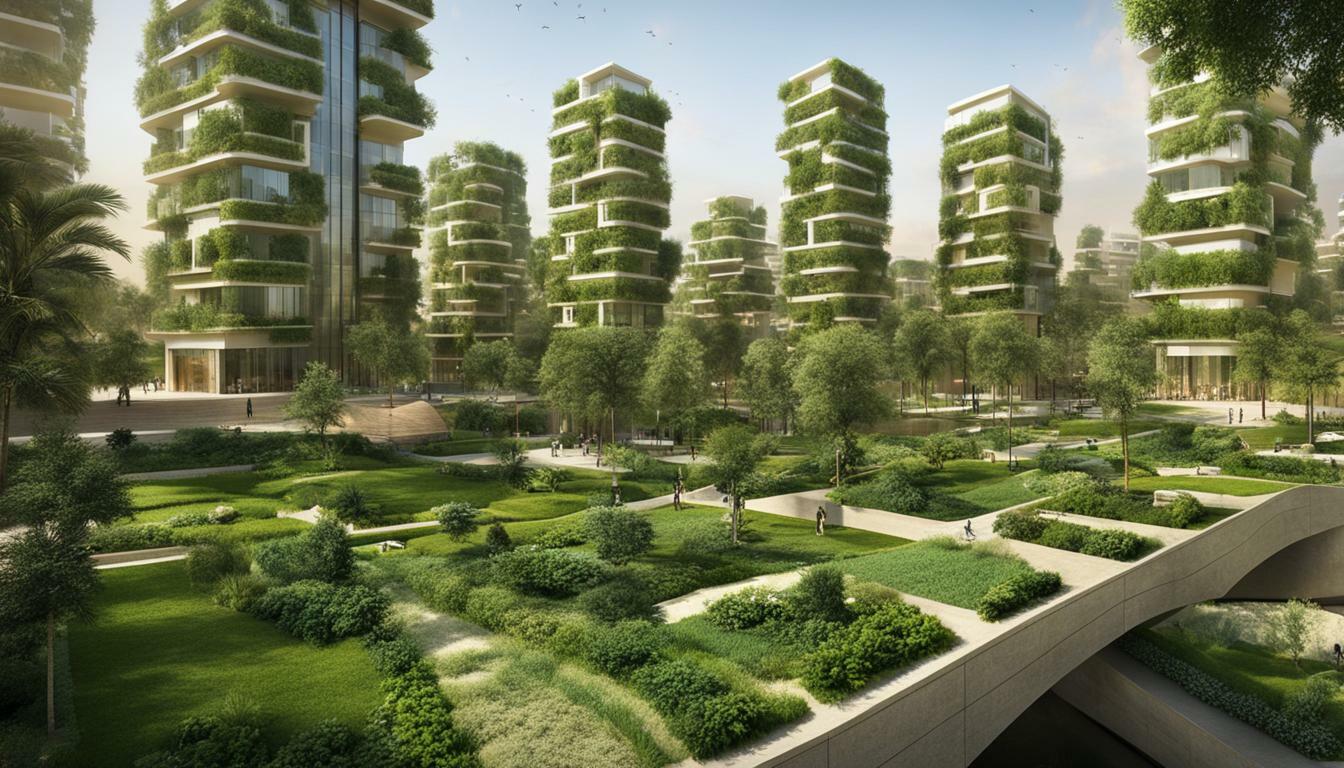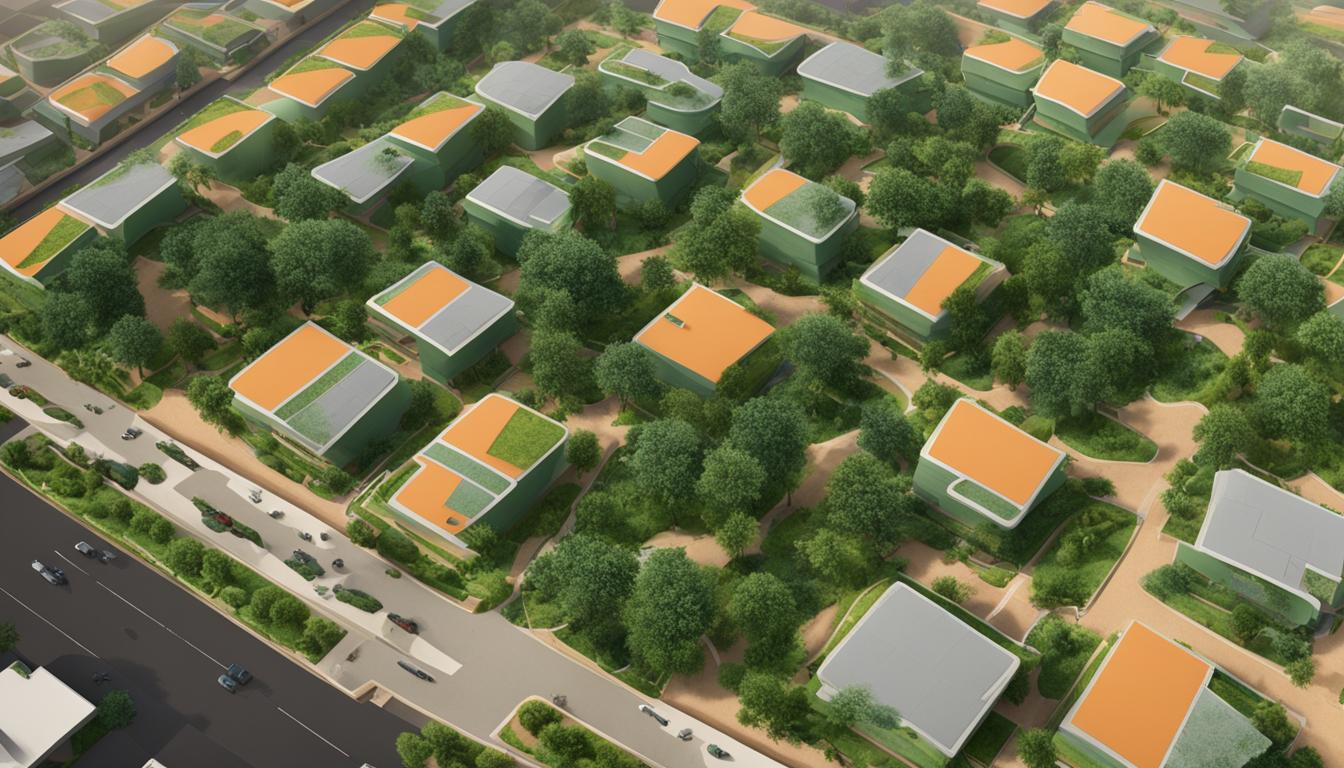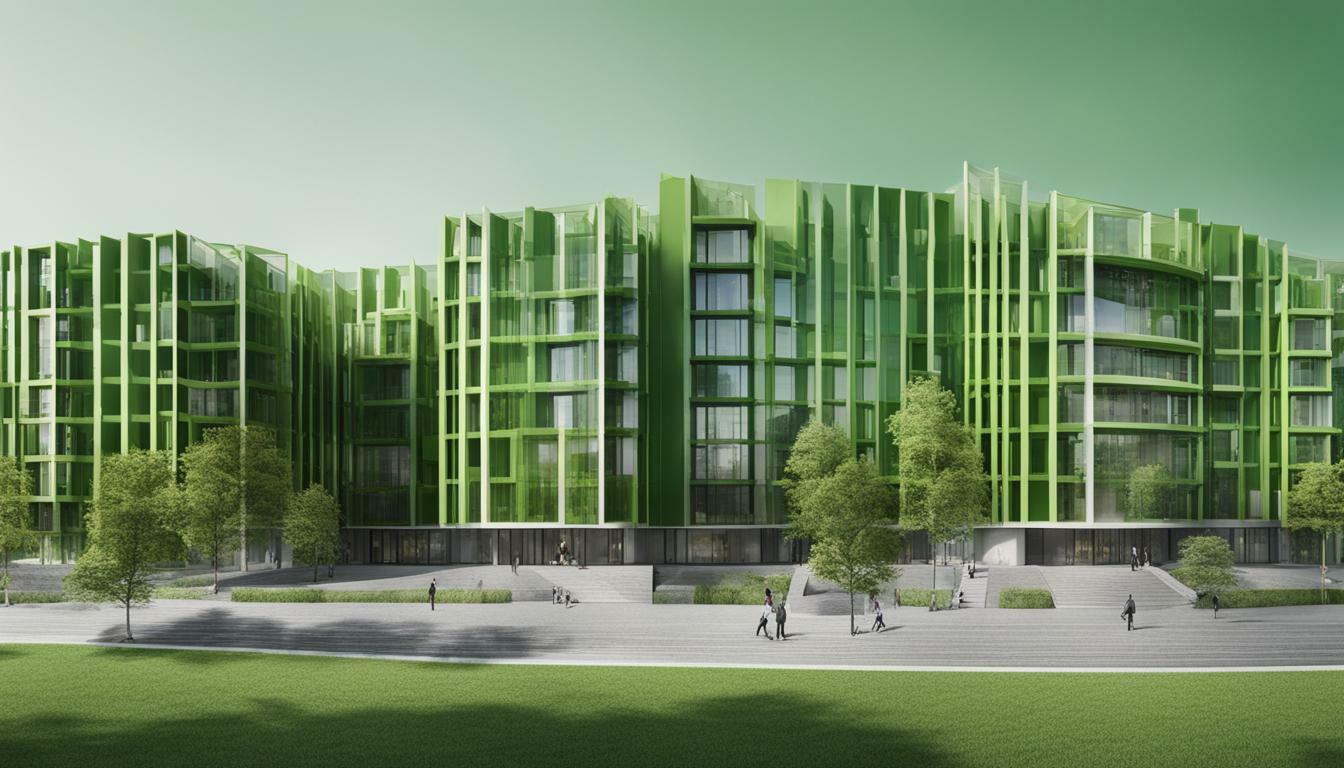Latvia Green Building History
Latvia has a rich history of embracing sustainable construction practices and environmental initiatives, making it a forefront in the green building movement. The research on sustainable building and green building assessment in Latvia indicates that sustainable building has become popular worldwide, with a focus on protecting the environment, using natural ventilation and daylight utilisation, and implementing waste management and water conservation.
The construction industry has a significant environmental impact, accounting for a large portion of global material consumption and energy consumption. Green building assessment tools are considered effective in promoting sustainable building, and there is a need to explore and analyse the present status of sustainable building and green building assessment in Latvia.
The development of green building assessment systems that are accepted worldwide is crucial. Implementation of green building practices can result in energy savings and other benefits for various market participants. International experience from countries like Japan, India, and China has shown the potential for energy reduction and cost savings in green buildings. In Latvia, there is a focus on renewable energy sources such as solar and wind power.
Overall, the research highlights the importance of energy aspects in green building practices and the need for further research and development in this field in Latvia.
- Latvia has a rich history of embracing sustainable construction practices and environmental initiatives.
- Sustainable building has become popular worldwide, with a focus on protecting the environment and utilising natural resources.
- Green building assessment tools are effective in promoting sustainable building and energy savings.
- Renewable energy sources such as solar and wind power are a focus in Latvia.
- Further research and development are needed in the field of green building practices in Latvia.
Sustainable Architecture in Latvia
Sustainable architecture has played a pivotal role in Latvia’s green building movement, with a strong emphasis on incorporating environmental initiatives into construction practices. The country has embraced sustainable building practices, focusing on protecting the environment, utilizing natural ventilation and daylight, and implementing waste management and water conservation.
Latvia recognizes the significant environmental impact of the construction industry, which accounts for a large portion of global material and energy consumption. To promote sustainable building, green building assessment tools have been considered effective in evaluating the environmental performance of buildings. It is essential to explore and analyze the current status of sustainable building and green building assessment in Latvia, as well as develop assessment systems that are accepted worldwide.
International experience from countries like Japan, India, and China have demonstrated the potential benefits of implementing green building practices. These include energy savings, reduced costs, and improved occupant comfort. Latvia has also been focusing on harnessing renewable energy sources, such as solar and wind power, to further enhance sustainability in its construction industry.

Overall, the research on sustainable architecture and green building assessment in Latvia highlights the importance of energy aspects in green building practices. It also underscores the need for further research and development in this field to drive sustainable construction forward in the country.
| Benefits of Sustainable Architecture in Latvia |
|---|
| Energy savings |
| Reduced costs |
| Improved occupant comfort |
| Protection of the environment |
“Sustainable architecture is not just about creating aesthetically pleasing structures, but also about building harmonious relationships between the built and natural environment.”
Environmental Initiatives in Latvian Construction
Latvia has taken significant strides in incorporating environmental initiatives into its construction practices. These initiatives include the use of sustainable materials, designing buildings for energy efficiency, and implementing advanced waste management systems. By prioritizing environmental sustainability, Latvia is paving the way for a greener future in its construction industry.
- Use of sustainable materials
- Designing for energy efficiency
- Implementation of advanced waste management systems
By leveraging the experience of other countries and exploring opportunities for renewable energy utilization, Latvia can continue to lead the way in sustainable architecture and contribute to a more environmentally friendly construction industry.
Green Building Assessment in Latvia
Latvia has embraced green building practices, with a strong focus on energy efficiency and eco-friendly construction methods that have resulted in the development of energy-efficient buildings. Sustainable building has become popular worldwide, with a priority on protecting the environment, utilizing natural ventilation and daylight, and implementing waste management and water conservation. The construction industry has a significant environmental impact, accounting for a large portion of global material and energy consumption.
In order to promote sustainable building, green building assessment tools are considered effective and there is a need to explore and analyze their present status in Latvia. Development of green building assessment systems that are accepted worldwide is crucial for the construction industry. By implementing these practices, energy savings and other benefits can be achieved for various market participants. International experience from countries like Japan, India, and China has shown the potential for energy reduction and cost savings in green buildings.
In Latvia, there is a strong focus on renewable energy sources such as solar and wind power. The country recognizes the importance of energy aspects in green building practices and is actively researching and developing in this field. Further research is needed to better understand and optimize energy-efficient technologies and construction methods in Latvia’s context. By incorporating renewable energy sources and sustainable practices, Latvia aims to contribute to the global green building movement and create a more sustainable built environment.

| Key Points | Benefits |
|---|---|
| Utilization of natural ventilation and daylight | Reduced energy consumption and improved indoor air quality |
| Implementation of waste management and water conservation | Reduced resource consumption and environmental impact |
| Focus on renewable energy sources | Increased energy independence and reduced greenhouse gas emissions |
Conclusion
Latvia’s commitment to green building practices, energy efficiency, and eco-friendly construction methods has led to the development of energy-efficient buildings. The country recognizes the importance of sustainable building and is actively exploring and implementing green building assessment tools. By incorporating renewable energy sources and sustainable practices, Latvia aims to contribute to a more sustainable built environment and reduce its environmental impact.
Renewable Energy Sources in Latvia
Latvia’s commitment to sustainable development is evident in its emphasis on renewable energy sources, such as solar and wind power, which have played a crucial role in the country’s green building movement. The utilization of these renewable energy sources has not only reduced Latvia’s carbon footprint but has also contributed to the overall energy efficiency of buildings and construction practices in the country.
According to research, the implementation of renewable energy sources in Latvia has resulted in significant energy savings and cost reductions for various market participants. Solar power, for example, has been harnessed through the installation of photovoltaic panels on rooftops and facades of buildings. These panels convert sunlight into electricity, thereby reducing the reliance on non-renewable energy sources. Similarly, wind power has been harnessed through the installation of wind turbines in suitable locations across the country, generating clean and sustainable energy for consumption.
| Renewable Energy Source | Advantages |
|---|---|
| Solar Power | – Reduces carbon emissions – Provides a source of clean energy – Low operating and maintenance costs |
| Wind Power | – Utilizes a natural and abundant resource – Provides a consistent source of energy – Contributes to energy independence |
By incorporating renewable energy sources into the construction and operation of buildings, Latvia aims to achieve a sustainable and energy-efficient built environment. These efforts align with the country’s broader goals of reducing greenhouse gas emissions, promoting energy security, and fostering a greener future.
“The utilization of renewable energy sources in Latvia is a testament to the country’s commitment to sustainable development. By harnessing the power of the sun and wind, Latvia is not only reducing its environmental impact but also paving the way for a more energy-efficient future.”
Key Points:
- Latvia emphasizes renewable energy sources in its green building movement.
- Solar and wind power contribute to energy efficiency and carbon reduction.
- Renewable energy sources result in energy savings and cost reductions.
- Latvia’s commitment to a sustainable and energy-efficient future is evident.

Latvia’s green building movement is fueled by the adoption of renewable energy sources, particularly solar and wind power. These sustainable energy sources have not only contributed to energy efficiency and carbon reduction but have also resulted in energy savings and cost reductions. By prioritizing renewable energy, Latvia is committed to a sustainable and energy-efficient future, aligning with its broader goals of reducing greenhouse gas emissions and promoting energy security.
International Experience and Potential Benefits
Drawing inspiration from international experiences, Latvia recognizes the potential benefits of implementing environmental initiatives, energy-efficient buildings, and eco-friendly construction practices within its own construction industry. Sustainable building practices have gained popularity worldwide, with a focus on protecting the environment, utilizing natural ventilation and daylight, and implementing waste management and water conservation strategies. The construction industry plays a significant role in environmental impact, accounting for a substantial portion of global material and energy consumption.
Green building assessment tools have proven effective in promoting sustainable building practices, and it is crucial to explore and analyze the current status of sustainable building and green building assessment in Latvia. The development of globally accepted green building assessment systems is paramount. Implementing green building practices can lead to energy savings and other benefits for various stakeholders in the market.
International experiences from countries like Japan, India, and China have demonstrated the potential for energy reduction and cost savings in green buildings. These success stories provide valuable insights into best practices and innovative solutions that can be replicated in Latvia’s construction industry.
| Country | Energy Reduction | Cost Savings |
|---|---|---|
| Japan | Up to 40% | Significant reduction in operational costs |
| India | Up to 50% | Lower energy bills and maintenance costs |
| China | Up to 30% | Increased property value and improved marketability |
In Latvia, there is a strong emphasis on renewable energy sources such as solar and wind power. The country recognizes the importance of harnessing clean and sustainable energy to reduce carbon emissions and mitigate climate change. By integrating renewable energy systems into green buildings, Latvia can further enhance its sustainability efforts and contribute to a greener future.
Overall, research highlights the significance of energy aspects in green building practices and underscores the need for further research and development in this field in Latvia. By leveraging international experiences and embracing environmental initiatives, energy-efficient buildings, and eco-friendly construction practices, Latvia can accelerate its progress towards a more sustainable and resilient construction industry.

Latvia’s green building history is a testament to the country’s dedication to sustainable construction practices, with a focus on environmental initiatives and the development of energy-efficient and eco-friendly buildings. The research on sustainable building and green building assessment in Latvia highlights the importance of protecting the environment, utilizing natural ventilation and daylight, and implementing waste management and water conservation.
The construction industry plays a significant role in global material consumption and energy consumption, making it crucial to promote sustainable building practices. Green building assessment tools have proven to be effective in this regard, and further exploration and analysis of the present status of sustainable building and green building assessment in Latvia are necessary.
International experiences from countries like Japan, India, and China have shown the potential benefits of implementing green building practices, including energy reduction and cost savings. In Latvia, there is a particular emphasis on renewable energy sources such as solar and wind power, contributing to the country’s sustainable development.
In conclusion, Latvia’s commitment to sustainable construction practices and the ongoing green building movement demonstrate its dedication to creating a greener and more environmentally friendly future. The importance of energy aspects in green building practices cannot be understated, and further research and development in this field are needed to continue driving Latvia’s sustainable construction industry forward.
FAQ
What is sustainable building?
Sustainable building refers to the practice of designing, constructing, and operating buildings in an environmentally responsible and resource-efficient manner. It aims to minimize the environmental impact of buildings while maximizing their benefits to occupants and society.
Why is sustainable building important?
Sustainable building is important because it helps protect the environment by reducing energy consumption, conserving water, and minimizing waste. It also promotes healthier and more comfortable living and working environments, while potentially reducing long-term costs for building owners and users.
What are green building assessment tools?
Green building assessment tools are frameworks or rating systems used to evaluate the environmental performance of buildings. They provide a standardized method for assessing and certifying the sustainability of a building based on various criteria, such as energy efficiency, water conservation, and materials used.
How can green building practices result in energy savings?
Green building practices, such as incorporating energy-efficient technologies, improving insulation, and optimizing natural daylight and ventilation, can significantly reduce energy consumption in buildings. This, in turn, can lead to lower energy bills and a reduced carbon footprint.
What renewable energy sources are emphasized in Latvia’s green building movement?
Latvia’s green building movement emphasizes the use of renewable energy sources such as solar power and wind power. These sources offer sustainable alternatives to traditional energy sources and contribute to the country’s overall goal of reducing its dependence on fossil fuels.
What potential benefits can be derived from implementing green building practices in Latvia?
Implementing green building practices in Latvia can lead to various benefits, including reduced energy consumption, lower utility costs for building owners, improved indoor air quality, enhanced occupant comfort and productivity, and a positive contribution to Latvia’s sustainable development goals.








